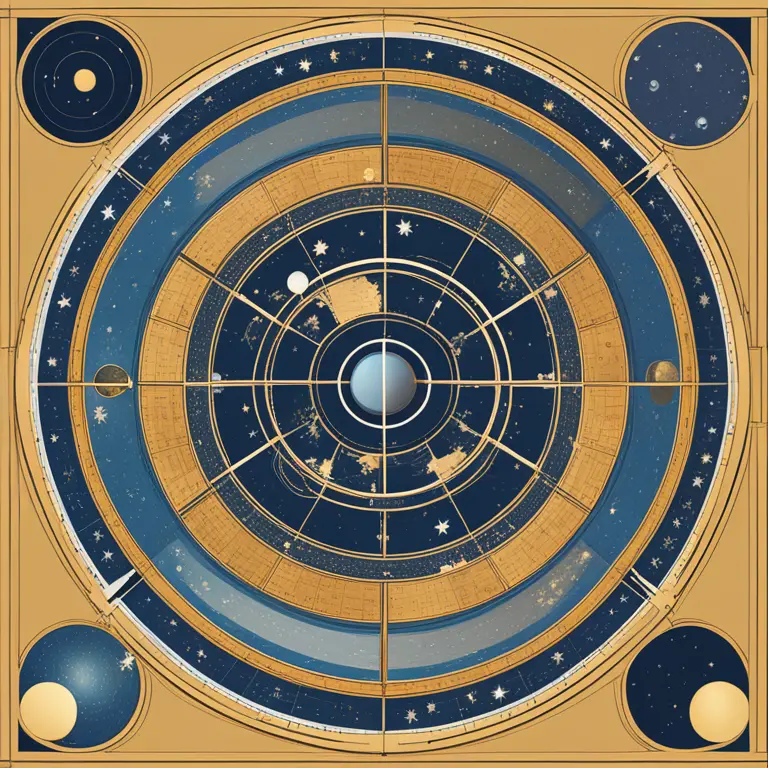
The Divide Between Astrology and Astronomy
Delve into the distinct worlds of astrology and astronomy, understanding their purposes and methodologies, and how they contribute uniquely to our comprehension of the universe.
article by Priya Deshmukh
Foundations of Astronomy and Astrology
Despite their intertwined history, astronomy and astrology stand today as starkly distinct disciplines with separate pursuits and methodologies. Astronomy is grounded in the empirical study of celestial phenomena, applying scientific principles to understand the unfeigned mechanics of the universe. Its focus is on acquiring factual knowledge about the cosmos, from the physics governing galaxies to the intricate orbits of planets. 2024's cutting-edge telescopes and computational models have advanced our comprehension of dark matter and exoplanets, further distinguishing modern astronomy from its ancient beginnings. Meanwhile, astrology takes a more esoteric approach, viewing celestial bodies as influencers of human affairs and the natural world, forming a tapestry of symbolic meanings. Despite a lack of empirical evidence to support its tenets, astrology continues to thrive as a cultural and spiritual experience for many.

Scientific Rigor vs. Symbolic Resonance
The primary difference between the two lies in their approach and application. Astronomy uses meticulous observation, mathematical calculations, and the scientific method to explain celestial events and test hypotheses. Discoveries such as the accelerating universe and gravitational waves showcase astronomy's commitment to understanding the cosmos through testable theories and data. Astrology, conversely, revolves around the interpretation of planetary placements and alignments to forecast and analyze personality traits and life events. Although once considered alongside astronomy as part of natural philosophy, astrology has since diverged, aligning itself with metaphysics and the human psyche instead of scientific scrutiny.

Tools and Techniques
The tools that characterize each practice also reflect their fundamental differences. Astronomy employs telescopes, spectrometers, probes, and other technological wonders to peer deep into space, capturing the awe-inspiring phenomena that unfold across the universe. The James Webb Space Telescope, operational in 2024, exemplifies the pinnacle of astrophysical technology, offering unprecedented insights into the early universe. On the other hand, astrology uses birth charts, also called natal charts, which map the position of the sun, moon, and planets at an individual's birth time to make predictions and provide guidance. While both rely on celestial information, the purposes and impacts of these instruments are worlds apart.

Impact on Culture and Society
Astronomy's advancements have profound implications for our understanding of life's origins and our place in the cosmos. The search for extraterrestrial intelligence and the potential for interstellar travel expand our perception of future possibilities. Astrology's impact is more personal and introspective, offering self-reflection and comfort to those who seek meaning in the stars. The ongoing popularity of horoscopes and zodiac signs, even in the face of scientific skepticism, highlights astrology's entrenched role in cultural practices and its influence on personal beliefs.
Education and Professionalism
As of 2024, the educational paths for these disciplines remain as divergent as their practices. Astronomers typically pursue extensive education, often culminating in advanced degrees that emphasize physics, mathematics, and computer science, preparing them for research and development in academic, governmental, and private sectors. Those endeavoring in astrology may attend courses or certification programs focused on interpreting cosmic symbolism and learning counseling techniques, often geared toward providing guidance rather than empirical analysis.
Observing the Future
Looking to the future, astronomy will continue to unravel the mysteries of the universe, driven by innovation and discovery. The study of dark energy, multi-messenger astronomy, and the potential reality of a multiverse lie at the fascinating frontier of contemporary science. Astrology's future seems more focused on its integration within the digital realm. Online horoscope services and astrological apps are gaining popularity, tailored to a new generation seeking personalized celestial insights.
Published: 2/5/2024
Modified: 2/5/2024
More predictions
Come back here soon to learn more about yourself and your future


Leo Zodiac Sign Insights: Traits, Love, and Destiny
Delve into the spirited world of Leo: learn about their bold traits, love compatibility, and 2024 forecast in this comprehensive guide.


Zodiac Signs' Essential Elements
Discover what each zodiac sign simply can't live without. Immerse yourself in the world of celestial necessitates unique to every sign.


From Zodiac Signs to Tarot Cards: A Celestial Guide
Connect the cosmic dots between your zodiac sign and the tarot with this insightful guide into the esoteric relationship of astrology and tarot card readings.